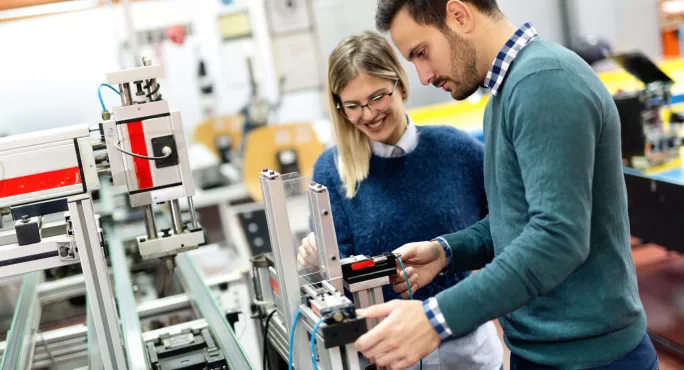Why employer knowledge is a force we can harness

Even after many years of working with employers in further education, January’s FE White Paper made me wince a little bit. I am a firm believer that the engagement of employers in the FE curriculum is a powerful force for educational and social good - but the paper delivers a soulless presentation of employers that makes it sound, as Sam Jones and Ian Pryce have pointed out, as though the future employees they are looking for are automata capable of no more than the performance of limited tasks linked to specific roles.
When it comes to curriculum design, the words on the page of the White Paper may not be hugely inspiring - but the reality is much richer, and, as FE practitioners, we know that the involvement of employers in the curriculum is full of potential to enhance the delivery of our courses. We just need to see beyond the pale political rhetoric and ensure that, as the real experts in this work, we bring the true possibilities of the paper’s proposals to life.
FE White Paper: Government to ‘overhaul’ accountability
Opinion: Why employer-led qualifications won’t work for learners
Gavin Williamson: Colleges ‘at the heart of Covid recovery’
During my years working with employers in FE, I have had the good fortune to encounter some brilliant people from industry, all with fascinating and inspiring career histories.
FE White Paper: Colleges working with employers
There is the former art historian now working for a water purification company who spotted the research potential of Covid-19 and is working with a university to explore the impact of lengthy lockdowns on water quality. There is the former printer’s apprentice who went into selling sanitary ware and is passionate about appliances that help organisations to minimise their environmental impact. There is the former languages teacher who is now an executive for a large multinational company and who specialises in addressing the gender imbalance in Stem industries.
The point here is that businesses, even big corporations, are made up of people, people with interesting and varied histories and passions who look beyond the immediate practical considerations of their jobs to the bigger social and cultural contexts within which they work. These professionals are knowledgeable, creative, imaginative and full of enthusiasm for their industries’ histories and future directions.
They also represent the kinds of employees that employers say they want: people with academic skills, including English and maths, and also skills and attributes such as originality and fluency of ideas, critical thinking, the ability to actively listen and to reflect, and the capacity to apply an inclusive and compassionate outlook to themselves and others.
Companies themselves are increasingly reflective, factoring environmental and social impact into their futures and thinking about alternative realities, including those shaped by digital developments such as AI. For educators, collaborative work with these individuals and organisations presents myriad opportunities for developing vibrant curricula that are knowledge-rich, attentive to the development of skills and attributes, engaged with the big issues facing humanity, and future facing.
In recent years, debates about curriculum content and the kinds of knowledge and skills we should be teaching have been particularly fierce. Michael Young has convincingly argued that school curricula should be built around “powerful knowledge”, knowledge at the heart of specific academic disciplines such as maths or history, that goes beyond the individual’s everyday experience. This knowledge is powerful because it provides the foundation for engaging in political, moral or other kinds of debates and for imagining future possibilities.
While this model may sit well with the purpose of schools, our task in FE is a bit different. In FE we go beyond this, linking the knowledge and skills students develop in their academic studies to a “real” world that includes employment. As a recent CBI/Pearson skills survey spells out, “knowledge is not maximised if you cannot apply it in the real world, nor are equipped with the character necessary to use the knowledge”.
If we look past the dry tones of the FE White Paper, we can glimpse possibilities for a model of “powerful knowledge applied”, reconfirming that curriculum development in FE has an identity of its own - one that builds on powerful knowledge, combining it with the most up-to-date lived experience of employers who can show how that knowledge can be used in the world of employment.
The inspiring individuals I described earlier are all brilliant examples of people who have taken knowledge developed within specific academic and vocational disciplines and used it to build socially engaged, future-facing careers. Collectively, they are a motivational and informative force that we can harness for the benefit of our students, either directly through their appearance in the classroom or through their contributions to curriculum development.
As FE practitioners, we are the people with the expertise necessary to translate the knowledge and skills of employers into forms of education that will ensure that our students will become the inspiring individuals of the future.
Alice Eardley is a faculty manager at Activate Learning
You need a Tes subscription to read this article
Subscribe now to read this article and get other subscriber-only content:
- Unlimited access to all Tes magazine content
- Exclusive subscriber-only stories
- Award-winning email newsletters
Already a subscriber? Log in
You need a subscription to read this article
Subscribe now to read this article and get other subscriber-only content, including:
- Unlimited access to all Tes magazine content
- Exclusive subscriber-only stories
- Award-winning email newsletters